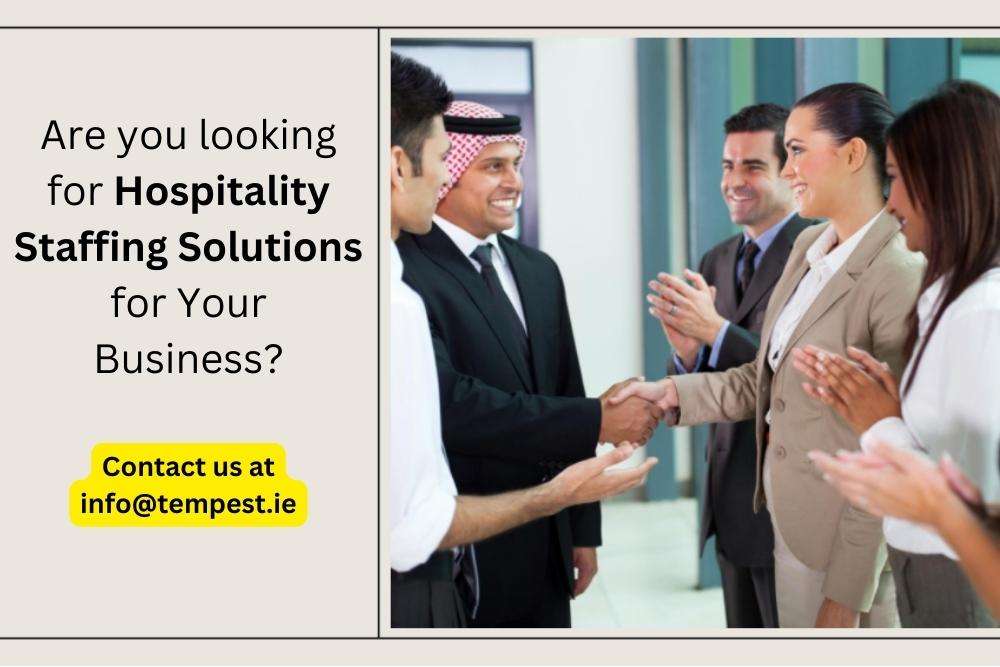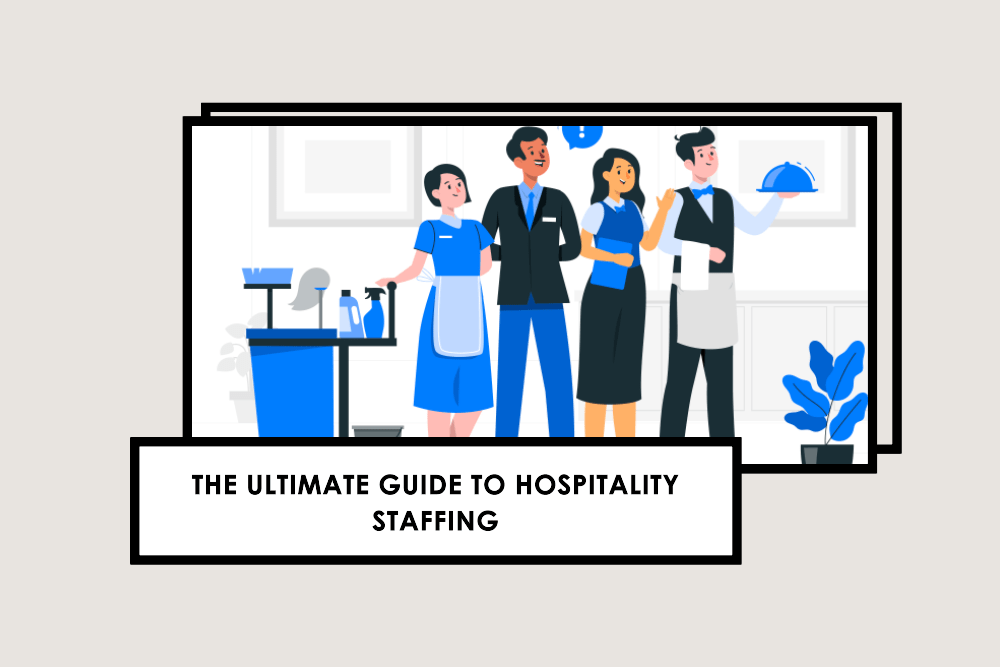Hospitality Staffing Solutions play a crucial role in ensuring that businesses have the right talent, skills, and expertise to deliver exceptional services consistently. A well-structured staffing strategy helps hospitality establishments maintain a steady flow of skilled employees, ensuring seamless operations even during peak seasons or unexpected fluctuations in demand. By tapping into the power of staffing agencies or temporary staff, businesses can gain access to a wider talent pool, allowing them to be agile and responsive to changing market dynamics.
Moreover, the hospitality industry often faces unique challenges related to staff turnover, seasonal demands, and evolving guest expectations. Staffing solutions provide a proactive approach to addressing these challenges, empowering businesses to adapt swiftly and maintain service excellence.
Key Challenges Faced by Hospitality Businesses in Staffing
Hospitality businesses grapple with a set of distinct challenges when it comes to staffing their teams. One of the primary obstacles is the high rate of employee turnover, especially in roles with high customer interaction. This constant turnover can disrupt team dynamics, affect service quality, and lead to increased recruitment costs.
Seasonality is another critical challenge faced by the industry. Peaks and troughs in demand can strain existing staff resources, leading to burnout and declining guest satisfaction levels. Navigating through these fluctuations requires a strategic approach to workforce planning, which is where staffing solutions come to the fore.
Furthermore, the hospitality industry’s labor market is becoming increasingly competitive. As guests’ expectations rise, businesses need to attract top talent to remain competitive. Crafting a compelling employer brand and offering enticing career development opportunities have become vital for talent acquisition and retention.
Understanding the Impact of Effective Staffing on Guest Experience
Guest experience is the cornerstone of success in the hospitality industry. When staffing is executed strategically, it creates a domino effect that positively influences every aspect of guest interactions. A well-trained and engaged staff fosters a welcoming and inviting atmosphere, which directly impacts guest satisfaction and loyalty.
Effective staffing ensures that guests encounter knowledgeable, skilled, and empathetic professionals who can cater to their unique needs and preferences. It enables hospitality businesses to deliver personalized services that leave a lasting impression on guests, encouraging repeat visits and positive word-of-mouth referrals.
In contrast, inadequate staffing, whether due to shortages or untrained employees, can lead to guest frustration, missed service standards, and potential negative reviews. Guests today are quick to share their experiences online, making it crucial for hospitality businesses to prioritize staffing solutions that uphold service quality consistently.
Benefits of Outsourcing Hospitality Staffing Needs
A. Enhanced Cost Management and Flexibility
Outsourcing hospitality staffing needs offers a myriad of financial advantages that contribute to improved cost management and operational flexibility. One of the key benefits lies in the ability to optimize labor costs. By partnering with staffing agencies, businesses can access a flexible workforce tailored to their exact requirements. During peak seasons or special events, additional staff can be seamlessly integrated, preventing overstaffing during quieter periods.
Moreover, outsourcing staffing needs eliminates the expenses associated with traditional recruitment processes, such as advertising, candidate screening, and background checks. Staffing agencies have extensive networks and databases of pre-screened candidates, which accelerates the recruitment timeline and reduces time-to-fill positions. This efficiency not only saves costs but also ensures that businesses can maintain optimal staffing levels without compromising service quality.
Additionally, outsourcing allows hospitality establishments to convert fixed personnel expenses into variable ones. Instead of maintaining a permanent workforce during slow seasons, businesses can scale down their labor costs by relying on temporary staff. This adaptability enables efficient resource allocation, making the operation more resilient to market fluctuations and economic uncertainties.
B. Access to Specialized Talent and Expertise
The hospitality industry encompasses diverse roles that require specific skills and expertise. Outsourcing staffing needs grants businesses access to a talent pool with a wide range of specialized professionals. Whether it’s skilled chefs, multilingual concierges, or event planning experts, staffing agencies can source candidates with niche skills that align with the unique demands of each hospitality establishment.
Having access to specialized talent not only enhances the quality of service provided but also enables businesses to offer niche experiences that cater to the preferences of their target clientele. By augmenting their teams with professionals well-versed in specific cuisines, cultural nuances, or event management, hospitality businesses can differentiate themselves in a competitive market, fostering a loyal customer base.
Furthermore, outsourcing staffing needs offers a valuable opportunity to tap into fresh perspectives and industry best practices. Temporarily engaging seasoned professionals with diverse backgrounds can inject new ideas and innovative approaches into daily operations, enriching the organization’s overall culture and creativity.
C. Streamlined Recruitment Processes
Recruitment processes can be time-consuming and resource-intensive, diverting valuable attention away from core business operations. Outsourcing hospitality staffing needs streamlines these processes, providing a seamless and efficient approach to talent acquisition.
Staffing agencies possess the expertise and resources to identify top candidates quickly. Their comprehensive networks and well-established screening procedures enable them to match the right individuals to the right roles, saving businesses the effort of sifting through numerous resumes and conducting extensive interviews.
Moreover, the agencies handle administrative tasks such as onboarding, payroll processing, and compliance with labor regulations. This relieves hospitality businesses of bureaucratic burdens, allowing them to concentrate on delivering exceptional guest experiences.
D. Mitigating HR and Legal Risks
The hospitality industry is subject to numerous employment laws and regulations, and compliance is paramount to avoid costly legal disputes. By outsourcing staffing needs, businesses benefit from working with agencies that are well-versed in employment laws and best practices, ensuring full compliance and risk mitigation.
Staffing agencies often assume the role of the employer of record for temporary staff, assuming legal responsibilities related to payroll taxes, insurance, and benefits. This transfer of liability significantly reduces the potential HR and legal risks faced by the hospitality business.
Furthermore, staffing agencies maintain up-to-date knowledge of industry standards and evolving regulations. This expertise is especially crucial when managing employee relations, terminations, and performance issues. With professional guidance, businesses can navigate potentially delicate situations with confidence and adherence to the law.
Read more about the Top 5 Key Benefits of Outsourcing Hospitality Staffing Needs here.
Leveraging Temporary Staffing for Maximizing Efficiency
A. Adapting to Seasonal and Peak Demand
In the dynamic world of the hospitality industry, demand can fluctuate dramatically based on seasonal trends, holidays, or special events. Effectively managing these variations is critical to ensure seamless operations and maintain exceptional guest experiences. Leveraging temporary staffing solutions empowers hospitality businesses to adapt swiftly to seasonal and peak demands.
Temporary staff can be strategically brought in during high-traffic periods to bolster existing teams. This approach not only prevents overburdening permanent staff but also ensures that service quality remains consistent even during times of increased footfall. By augmenting the workforce with skilled temporary professionals, businesses can handle the surge in demand without compromising on efficiency or guest satisfaction.
Furthermore, adapting to seasonal and peak demand through temporary staffing solutions enables businesses to optimize their labor costs. Instead of maintaining a full-time staff roster to cater to occasional spikes in demand, businesses can scale their workforce up and down as needed. This cost-effective approach ensures that staffing expenses align with revenue-generating opportunities, improving the overall financial health of the establishment.
B. Covering Staff Absences and Leaves
Absences due to illness, personal emergencies, or planned leaves are inevitable in any workforce. In the hospitality industry, where consistent service is paramount, managing staff absences effectively is essential to prevent service disruptions and maintain a positive guest experience.
Temporary staffing solutions offer a lifeline during such situations, providing businesses with a reliable pool of professionals who can seamlessly step in and cover for absent staff. Whether it’s a front desk receptionist, a housekeeping associate, or a restaurant server, temporary staff can quickly fill the gaps and maintain operational continuity.
Moreover, relying on temporary staff for covering absences saves businesses from the time and effort involved in urgent recruitment processes or redistributing tasks among existing staff. This approach ensures that teams remain focused on delivering top-notch service, even in the face of unforeseen circumstances.
C. Balancing Workforce during Fluctuating Business Cycles
The hospitality industry is subject to unpredictable business cycles influenced by economic factors, changing consumer behavior, or global events. Balancing the workforce during these fluctuations is a strategic challenge that can be effectively addressed through temporary staffing solutions.
During slow periods, businesses can scale down their permanent staff and rely on temporary staff to maintain essential operations. This approach optimizes labor costs and prevents the financial strain of retaining a full-time workforce during lulls in demand.
Conversely, when business picks up, temporary staff can be rapidly integrated to supplement the existing team and ensure that service standards remain uncompromised. The flexibility offered by temporary staffing enables businesses to stay agile and responsive, positioning them to capitalize on new opportunities swiftly.
Furthermore, by having access to a skilled and flexible temporary workforce, hospitality businesses can experiment with new offerings, expand their service portfolio, or undertake renovation projects without overcommitting to permanent hires. This strategic approach empowers businesses to explore growth avenues and remain competitive in a rapidly evolving industry.
Learn more on How Temporary Staffing Can Benefit Your Business here.
Training and Development in the Hospitality Industry
A. Identifying Skill Gaps and Training Needs
In the ever-evolving landscape of the hospitality industry, investing in training and development is not just a competitive advantage; it is a necessity. Identifying skill gaps and training needs within the workforce is the first step towards fostering a high-performing team that consistently delivers exceptional guest experiences.
To identify skill gaps, hospitality businesses can conduct comprehensive assessments and performance evaluations of their employees. By analyzing guest feedback, performance metrics, and employee self-assessments, managers can pinpoint areas where improvement is required. Additionally, staying attuned to industry trends and emerging guest preferences can help identify new skill sets and competencies that are crucial for maintaining a competitive edge.
Moreover, involving employees in the identification process through surveys or focus groups fosters a sense of ownership and empowerment. It helps ensure that training initiatives are tailored to address the specific needs and challenges faced by the team members, leading to greater engagement and commitment to professional growth.
B. Implementing Effective Training Programs
Implementing effective training programs is a pivotal aspect of nurturing a skilled and motivated hospitality workforce. Training initiatives should be designed to address identified skill gaps, enhance job-specific competencies, and instill a culture of continuous learning and improvement.
A comprehensive training program encompasses a blend of on-the-job training, workshops, seminars, e-learning modules, and mentorship opportunities. Emphasizing hands-on experiences allows employees to apply theoretical knowledge to real-world scenarios, honing their skills in a practical context.
Furthermore, incorporating interactive and immersive training methods enhances engagement and knowledge retention. Role-playing exercises, scenario-based simulations, and gamification elements can make training sessions both informative and enjoyable, leading to increased motivation among employees to participate actively in the learning process.
To maximize the impact of training initiatives, it is essential to align them with the organization’s overall goals and values. Training should not only focus on technical skills but also emphasize soft skills such as communication, empathy, and problem-solving, which are instrumental in delivering exceptional guest experiences.
For Certified Staff Training Courses, you may enroll here.
C. Nurturing Leadership and Career Growth Opportunities
In the hospitality industry, cultivating leadership and providing clear career growth pathways are vital for employee retention and overall organizational success. Employees who see a clear trajectory for advancement are more likely to stay committed to an organization and invest in their personal development.
Mentorship programs and leadership development initiatives are valuable tools for nurturing the next generation of leaders within the organization. Pairing aspiring leaders with experienced mentors allows them to learn from seasoned professionals, gain valuable insights, and receive personalized guidance on their career journeys.
Additionally, offering cross-functional training and job rotations can expose employees to different areas of the hospitality business, broadening their skill sets and perspectives. This not only keeps them engaged but also enables them to develop a more comprehensive understanding of the industry, which is beneficial when assuming leadership roles.
Creating a culture that celebrates and recognizes employee achievements and contributions is equally crucial. Regular feedback, performance-based rewards, and opportunities for acknowledgment motivate employees to strive for excellence and actively seek career growth within the organization.
Building a High-Performing Hospitality Team
A. Crafting a Winning Employer Brand
In the fiercely competitive landscape of the hospitality industry, crafting a compelling employer brand is crucial for attracting top talent and building a high-performing team. An employer brand is the unique identity and reputation that an organization presents to the job market, conveying its values, culture, and employee value proposition.
To create a winning employer brand, hospitality businesses must start by defining their core values and mission. This involves identifying what makes the organization stand out, what it offers to its employees beyond just a paycheck, and the overall impact it strives to achieve in the industry and the community.
Transparency is paramount when communicating the employer brand. Authenticity and honesty in portraying the work environment, growth opportunities, and potential challenges help set realistic expectations for candidates and build trust. Sharing employee testimonials and success stories can further humanize the brand and provide valuable insights into the employee experience.
Leveraging digital platforms and social media is essential to reach and engage with potential candidates effectively. A well-crafted career website and active presence on professional networking sites can attract passive candidates and showcase the organization’s commitment to its workforce.
Additionally, fostering a positive company culture that prioritizes employee well-being, recognition, and development reinforces the employer brand. Engaged and satisfied employees become brand ambassadors, attracting like-minded individuals who align with the organization’s values.
B. Employee Engagement Strategies for Improved Productivity
Employee engagement is the bedrock of a high-performing hospitality team. Engaged employees are not only more productive but also more likely to deliver exceptional guest experiences and remain loyal to the organization.
To boost employee engagement, hospitality businesses should focus on several key strategies. First and foremost, communication is paramount. Regularly communicating organizational goals, updates, and achievements ensures that employees feel connected to the bigger picture and understand how their contributions make a difference.
Recognizing and appreciating employee efforts is equally important. Implementing a robust employee recognition program that acknowledges outstanding performance, teamwork, and dedication fosters a culture of appreciation and boosts morale.
Encouraging employee feedback and involvement in decision-making empowers team members and demonstrates that their opinions are valued. Creating platforms for open discussions, suggestion boxes, or employee surveys helps identify pain points and areas for improvement, leading to a more engaged and motivated workforce.
Investing in employee development and growth opportunities is a significant driver of engagement. Offering training programs, workshops, and mentorship opportunities communicates the organization’s commitment to nurturing individual careers, reinforcing the sense of loyalty and investment in the organization’s success.
C. Best Practices in Interview Techniques and Selection
Selecting the right candidates is instrumental in building a high-performing hospitality team. Effective interview techniques and selection practices ensure that candidates not only possess the necessary skills but also align with the organization’s values and culture.
To conduct successful interviews, hospitality businesses should adopt a structured approach. This involves defining clear job requirements, competencies, and behavioral traits essential for the role. Developing a standardized interview guide with relevant questions helps assess candidates consistently and objectively.
Behavioral interviewing is an excellent technique for understanding how candidates have handled situations in the past, as it predicts future performance. Asking candidates to share specific examples of how they have demonstrated key competencies, such as problem-solving, adaptability, or teamwork, provides valuable insights into their capabilities.
Incorporating situational exercises or role-playing scenarios into the interview process can further assess candidates’ on-the-job skills and problem-solving abilities. These exercises simulate real-world challenges that candidates may encounter in the hospitality setting, allowing recruiters to gauge their responses and decision-making processes.
Collaborative interviewing, involving multiple team members and stakeholders, provides diverse perspectives and ensures that the hiring decision is well-informed. This approach also gives candidates the opportunity to interact with potential future colleagues, contributing to a positive candidate experience.
Embracing Remote Work in Hospitality
A. Managing Virtual Teams for Success
The hospitality industry has traditionally been characterized by on-site, in-person interactions with guests. However, recent global shifts and technological advancements have paved the way for remote work to become a viable option for certain roles within the sector. Effectively managing virtual teams is crucial to harnessing the benefits of remote work while maintaining service excellence.
To manage virtual teams successfully, hospitality businesses should prioritize clear communication and goal alignment. Establishing regular check-ins and virtual meetings ensures that team members stay connected, collaborate effectively, and are updated on key developments. Additionally, setting measurable goals and performance metrics helps remote employees understand expectations and stay focused on achieving their objectives.
Implementing a robust project management system is essential for organizing tasks, tracking progress, and ensuring accountability among remote team members. Digital tools, such as project boards, time-tracking software, and task management applications, facilitate seamless collaboration and foster a sense of unity among dispersed teams.
Encouraging a culture of trust and autonomy is also vital for remote team success. Empowering employees to make decisions and manage their work schedules fosters a sense of ownership and responsibility. Flexibility in how tasks are accomplished allows team members to work in ways that suit their individual preferences and productivity rhythms.
B. Technology Solutions for Remote Collaboration
Embracing remote work in the hospitality industry necessitates leveraging technology solutions that enable efficient and effective collaboration among virtual teams.
Cloud-based communication platforms, such as video conferencing and instant messaging tools, facilitate real-time interactions and foster a sense of camaraderie among remote team members. Video calls allow face-to-face conversations, which can strengthen personal connections and improve team dynamics, despite geographical distances.
Collaborative document sharing and storage systems streamline remote work processes, enabling team members to access and edit files in real-time, regardless of their location. These platforms promote seamless collaboration, version control, and secure information sharing, which are critical in a fast-paced hospitality environment.
Virtual training platforms offer opportunities for continuous learning and skill development among remote employees. Webinars, e-learning modules, and online workshops ensure that team members stay updated on industry trends, best practices, and new technologies, enhancing their capabilities and keeping them engaged in their professional growth.
Utilizing project management tools with task assignment and progress tracking functionalities allows managers to allocate tasks effectively, monitor individual and team performance, and ensure that projects stay on track, even in a remote work setting.
C. Overcoming Challenges in Remote Staff Management
While remote work offers various advantages, it also presents unique challenges in staff management that hospitality businesses must address to maintain efficiency and productivity.
One of the primary challenges is maintaining team cohesion and a sense of belonging among remote employees. Regular team-building activities, virtual social events, and open communication channels contribute to fostering a strong team culture, even in a remote work environment.
Setting clear expectations and establishing key performance indicators (KPIs) are essential for remote staff management. These metrics enable managers to assess individual and team performance objectively and address any performance issues proactively.
Monitoring and supporting employee well-being is crucial for remote staff management. Prolonged isolation and reduced face-to-face interactions can lead to feelings of disconnection and burnout. Encouraging work-life balance, providing mental health resources, and showing empathy towards employees’ unique circumstances create a supportive work environment.
Cybersecurity and data protection are critical considerations when managing remote staff. Implementing robust security measures, conducting regular cybersecurity training, and ensuring compliance with data protection regulations are essential to safeguarding sensitive information and maintaining the trust of guests and clients.
The Role of Technology in Modern Hospitality Staffing Solutions
A. Leveraging AI and Automation in Recruitment
In the fast-paced and competitive hospitality industry, leveraging technology has become instrumental in streamlining recruitment processes and acquiring top talent efficiently. Artificial Intelligence (AI) and automation play a pivotal role in modern hospitality staffing solutions, revolutionizing how businesses attract, screen, and hire candidates.
AI-driven algorithms can analyze vast amounts of data from multiple sources, such as online job boards, social media profiles, and professional networking platforms, to identify potential candidates who possess the desired skills and qualifications. By automating the initial screening process, AI eliminates much of the manual effort involved in candidate sourcing, allowing recruiters to focus on more strategic aspects of talent acquisition.
Moreover, AI-powered chatbots and virtual assistants can engage with candidates in real-time, providing immediate responses to inquiries, scheduling interviews, and guiding candidates through the application process. These interactive tools create a positive candidate experience and expedite the recruitment timeline, ensuring that top talent is engaged and retained throughout the hiring process.
AI also enables data-driven candidate matching, wherein candidate profiles are compared against job requirements and organizational fit criteria to identify the most suitable candidates. This objective approach minimizes bias and enhances the likelihood of making informed and unbiased hiring decisions.
B. Applicant Tracking Systems and Talent Pools
Applicant Tracking Systems (ATS) are essential components of modern hospitality staffing solutions, empowering businesses to efficiently manage the entire recruitment lifecycle, from sourcing to onboarding.
ATS allows recruiters to centralize candidate data, including resumes, cover letters, and assessment results, simplifying the organization and retrieval of applicant information. This streamlines the screening process and ensures that no promising candidate profiles slip through the cracks.
Moreover, ATS provides a user-friendly interface for collaboration among team members involved in the hiring process. Recruiters, hiring managers, and other stakeholders can access candidate profiles, leave feedback, and communicate effectively within the system, ensuring a seamless and well-coordinated hiring process.
Building and maintaining a talent pool is another critical function of ATS. A talent pool is a repository of potential candidates who have expressed interest in working for the organization, even if no immediate openings exist. Having a talent pool readily available expedites future hiring needs and reduces time-to-fill positions, especially for roles with frequent turnover or specific skill requirements.
Additionally, ATS enables recruiters to create talent pipelines for niche positions or hard-to-fill roles. Proactively nurturing relationships with potential candidates in these talent pipelines ensures that businesses have access to a qualified and engaged pool of talent when the need arises.
C. HR Analytics for Informed Decision Making
In the era of data-driven decision-making, HR analytics has emerged as a powerful tool for modern hospitality staffing solutions. HR analytics involves the collection, analysis, and interpretation of workforce data to identify patterns, trends, and opportunities for improvement.
By leveraging HR analytics, hospitality businesses gain valuable insights into various aspects of their staffing processes. Metrics such as time-to-hire, cost-per-hire, and candidate sourcing channels provide valuable performance indicators, helping recruiters optimize recruitment strategies and allocation of resources.
Moreover, HR analytics can identify potential bottlenecks and inefficiencies in the hiring process, enabling organizations to streamline workflows and reduce time and effort spent on administrative tasks.
Data-driven talent acquisition strategies enable businesses to identify the most effective sourcing channels and recruitment methods for attracting top talent. By focusing on channels that yield the highest-quality candidates, organizations can optimize their recruitment marketing budget and improve candidate quality.
HR analytics also contributes to talent retention by identifying patterns related to employee turnover and satisfaction. Understanding factors that impact employee retention allows businesses to implement targeted strategies for talent development, engagement, and long-term success.
Promoting Diversity and Inclusivity in Hospitality Hiring
A. The Business Case for Diversity in the Workplace
Promoting diversity and inclusivity in hospitality hiring is not just a moral imperative; it is also a strategic business decision that yields significant benefits. The business case for diversity is multifaceted and encompasses various advantages that positively impact the organization’s performance, reputation, and overall success.
Firstly, diverse teams bring a wealth of perspectives and ideas to the table. In the hospitality industry, where creativity and innovation are crucial for staying ahead of the competition, diverse teams can offer fresh insights and unique solutions to challenges. The blending of diverse backgrounds, experiences, and cultural perspectives fosters creativity, leading to improved problem-solving and better decision-making.
Secondly, a diverse workforce enhances the organization’s ability to connect with a broader range of guests. In a globalized world, hospitality businesses cater to a diverse clientele with varying preferences and cultural expectations. Having a team that reflects the diversity of guests allows the organization to establish more meaningful and authentic connections, ultimately leading to enhanced guest satisfaction and loyalty.
Furthermore, a diverse workforce can help the organization expand into new markets and diversify its offerings. By understanding different cultural nuances and preferences, hospitality businesses can tailor their services to cater to niche markets and attract a wider customer base.
Beyond the external benefits, fostering diversity and inclusion internally contributes to employee satisfaction and retention. When employees feel valued, respected, and included, they are more likely to be engaged and committed to the organization. This, in turn, reduces turnover, lowers recruitment costs, and boosts productivity and teamwork.
B. Inclusive Hiring Practices and Bias Mitigation
Inclusive hiring practices are essential for ensuring that diversity is genuinely represented throughout the recruitment process. Mitigating bias at every stage of hiring is crucial to attracting a diverse pool of candidates and selecting the most qualified individuals based on merit.
To foster inclusivity, hospitality businesses can start by reevaluating job descriptions to ensure they use inclusive language and focus on essential qualifications rather than specific characteristics that may inadvertently discourage certain groups from applying.
Blind resume reviews, where personal information like names and addresses are removed from candidate profiles, help eliminate unconscious biases during the initial screening process. This approach ensures that candidates are evaluated solely on their skills and qualifications.
Inclusive interview techniques, such as structured interviews with standardized questions, help ensure consistency and fairness. Training interviewers to recognize and avoid biased behavior further supports a more inclusive hiring process.
Diverse interview panels, involving employees from various backgrounds and levels within the organization, contribute to a more holistic evaluation of candidates. Additionally, allowing candidates to interact with potential future colleagues during the interview process provides them with a sense of the organization’s culture and inclusivity.
C. Fostering a Culture of Diversity and Belonging
Fostering a culture of diversity and belonging goes beyond the recruitment process and extends to the entire employee lifecycle. Hospitality businesses must actively cultivate an inclusive work environment that encourages employee engagement, growth, and collaboration.
Diversity and inclusion training for all employees, from front-line staff to top management, is crucial for creating a shared understanding of the importance of diversity and the role each individual plays in promoting inclusivity.
Establishing Employee Resource Groups (ERGs) or affinity groups provides a platform for employees to come together based on shared characteristics, experiences, or interests. ERGs foster a sense of community, allowing employees to support one another, share insights, and advocate for positive change within the organization.
Leadership plays a critical role in championing diversity and inclusion. Executives and managers should demonstrate their commitment to diversity by promoting inclusive behaviors, offering mentorship to employees from underrepresented backgrounds, and actively seeking diverse perspectives in decision-making.
Recognizing and celebrating diverse cultural events and holidays reinforces the organization’s commitment to inclusivity. Embracing cultural diversity enriches the workplace and creates a sense of belonging for employees from different backgrounds.
Lastly, regularly measuring and tracking diversity and inclusion metrics allows the organization to monitor progress, identify areas for improvement, and hold itself accountable for promoting diversity and inclusivity.
Top Trends in Hospitality Staffing and Talent Management
A. Navigating Gig Economy and Freelancer Integration
The gig economy and the rise of freelance workers have made a significant impact on the hospitality industry’s staffing landscape. Navigating this trend and effectively integrating gig workers require a strategic approach that balances the benefits of flexibility with the need for a cohesive and high-performing team.
One of the key advantages of the gig economy for hospitality businesses is the ability to access specialized skills on-demand. By engaging freelancers for specific projects or peak periods, organizations can tap into a diverse talent pool with expertise in niche areas, such as digital marketing, event planning, or technology implementation.
Moreover, gig workers offer the flexibility to scale the workforce up or down based on fluctuating demand, enabling businesses to optimize labor costs without compromising service quality. This adaptability is particularly valuable in an industry with seasonal peaks and varying customer demands.
To effectively integrate gig workers, hospitality businesses should implement robust onboarding and training processes to ensure that freelancers align with the organization’s values, service standards, and brand identity. Establishing clear communication channels and expectations from the outset fosters seamless collaboration between full-time staff and freelancers, contributing to a harmonious and productive work environment.
B. Future Skills and Roles in the Hospitality Industry
The rapidly evolving hospitality landscape has given rise to new skill requirements and roles within the industry. Anticipating future skills needs is essential for proactive talent management and staying ahead of competitors in a fast-changing market.
One prominent future skill in hospitality is digital literacy and proficiency in technology. With the increasing use of mobile apps, online reservations, and contactless services, employees need to be tech-savvy and capable of leveraging digital tools to enhance guest experiences.
Data analytics and insights have become invaluable for hospitality businesses seeking to personalize guest offerings and optimize operational efficiency. Employees who possess data analysis skills and can interpret customer behavior trends will be instrumental in driving data-driven decision-making.
Emotional intelligence and empathy are timeless skills that will continue to hold immense value in the hospitality industry. The ability to understand and cater to diverse guest needs, respond to feedback with empathy, and forge meaningful connections with customers remains central to delivering exceptional service.
As sustainability becomes an increasingly critical aspect of the hospitality industry, employees with a deep understanding of eco-friendly practices and green initiatives will be in high demand. Roles such as sustainability managers or eco-conscious hospitality consultants will play an essential role in shaping sustainable business practices.
C. Adapting to Changing Workforce Preferences
The preferences and expectations of the modern workforce are continually evolving, requiring hospitality businesses to adapt their talent management strategies to attract and retain top talent.
One significant trend is the growing emphasis on work-life balance. The workforce, particularly millennials and Gen Z, seeks job opportunities that offer flexibility, remote work options, and wellness programs. Hospitality businesses that can accommodate these preferences will have a competitive advantage in attracting top talent.
Employee development and career growth opportunities are increasingly crucial for retaining talent. Providing clear pathways for advancement, offering skill development programs, and cross-training employees for diverse roles can contribute to a motivated and engaged workforce.
The importance of diversity and inclusivity in the workplace cannot be overstated. Job seekers are increasingly looking for organizations that value diversity, equity, and inclusion. Hospitality businesses that prioritize creating an inclusive work environment and promoting diverse leadership will be better positioned to attract and retain top talent.
Additionally, aligning the organization’s values with those of potential employees is vital. Job seekers are increasingly drawn to employers who demonstrate a commitment to social responsibility, sustainability, and ethical business practices.
Addressing Staff Shortages: Strategies for Successful Recruitment
A. Identifying Recruitment Pain Points and Barriers
Staff shortages can pose significant challenges for hospitality businesses, impacting service quality and guest satisfaction. Addressing these shortages requires a comprehensive understanding of the recruitment pain points and barriers unique to the industry.
One of the common pain points in hospitality recruitment is high turnover rates. Understanding the root causes of turnover, such as low job satisfaction or inadequate training, can help organizations implement targeted retention strategies to reduce turnover and retain valuable talent.
The seasonal nature of the hospitality industry can also lead to fluctuations in workforce demand. Identifying peak periods and seasonal trends is essential for planning ahead and ensuring adequate staffing levels during busy times.
Barriers in the recruitment process, such as lengthy hiring timelines or inefficient candidate screening, can deter potential applicants. Streamlining the hiring process, leveraging technology for automated screening, and providing prompt feedback to candidates are crucial in attracting top talent and securing their commitment.
Additionally, identifying specific skill shortages or hard-to-fill roles allows organizations to focus their recruitment efforts and explore alternative solutions, such as upskilling existing staff or partnering with educational institutions for targeted training programs.
B. Creative Sourcing Methods and Talent Pipelining
To address staff shortages effectively, hospitality businesses must explore creative sourcing methods and build talent pipelines that continuously nurture potential candidates.
Embracing digital platforms and social media for recruitment marketing is essential in reaching a broader audience of potential candidates. Engaging with job seekers through visually appealing and informative content can showcase the organization’s culture and values, helping it stand out as an employer of choice.
Collaborating with industry-specific job boards and recruitment agencies can extend the organization’s reach and connect it with passive candidates who may not actively search for job opportunities but are open to attractive offers.
Talent pipelining involves proactively engaging with potential candidates, even when no immediate openings exist. Building and maintaining relationships with individuals who have expressed interest in the organization or possess sought-after skills enables swift and targeted recruitment when vacancies arise.
Internship and apprenticeship programs can serve as an effective talent pipeline strategy. Offering practical experience and mentorship opportunities to students or entry-level candidates can lead to long-term employment relationships and a pool of trained talent.
C. Attracting Passive Candidates and Talent Networks
Attracting passive candidates, who are currently employed but open to new opportunities, is a valuable approach for addressing staff shortages with high-quality talent.
Creating an appealing employer brand that showcases the organization’s commitment to employee development, work-life balance, and a positive work environment can pique the interest of passive candidates and entice them to explore opportunities within the organization.
Networking events, industry conferences, and professional associations offer valuable platforms for engaging with passive candidates. Actively participating in these forums allows organizations to build rapport with potential candidates and establish themselves as industry leaders.
Employee referral programs can be powerful in attracting passive candidates. Satisfied and engaged employees are more likely to refer individuals from their network, who may be a good fit for the organization’s culture and requirements.
Organizations can also leverage technology and data analytics to identify and approach potential passive candidates. LinkedIn and other professional networking platforms provide insights into candidates’ backgrounds, skills, and career interests, facilitating targeted outreach.
Predicting the Future of Hospitality Staffing
A. Emerging Technologies and their Impact on Staffing
The future of hospitality staffing is deeply intertwined with the continuous advancements in technology. Emerging technologies are poised to revolutionize various aspects of the staffing process, from recruitment to workforce management.
- Artificial Intelligence (AI) and Automation: AI-powered tools and automation will streamline candidate sourcing, screening, and selection, significantly reducing manual effort and time. Chatbots and virtual assistants will enhance candidate engagement, providing immediate responses and guiding applicants through the hiring process. Additionally, AI-driven algorithms will optimize workforce scheduling and resource allocation, ensuring efficient staff deployment based on demand fluctuations.
- Augmented Reality (AR) and Virtual Reality (VR): AR and VR technologies will play a crucial role in training and onboarding new staff. Immersive training modules will allow employees to practice real-life scenarios, enhancing their skills and confidence. Virtual tours and simulations will enable potential candidates to experience the work environment, giving them a sense of the organization’s culture and work expectations.
- Data Analytics and Predictive HR: HR analytics will become more sophisticated, enabling organizations to predict workforce trends and identify potential staffing gaps. Predictive HR analytics will help businesses anticipate turnover and proactively implement strategies to retain top talent. Data-driven insights will also inform personalized career development plans, enhancing employee engagement and job satisfaction.
- Robotics and Automation in Operations: In certain areas of hospitality, such as housekeeping and foodservice, robots and automation will be increasingly deployed to handle repetitive tasks, improving operational efficiency and reducing the strain on human resources. This shift will require upskilling existing employees to work effectively alongside robotic counterparts.
B. Evolving Workforce Dynamics and Labor Market Trends
The future of hospitality staffing will witness significant shifts in workforce dynamics and labor market trends, necessitating adaptable talent management strategies.
- Remote Work and Flexible Work Arrangements: The experience gained during global challenges like the COVID-19 pandemic has accelerated the adoption of remote work in the hospitality industry. The demand for flexible work arrangements will persist, enabling businesses to tap into a broader talent pool and retain employees seeking work-life balance.
- Multi-generational Workforce: The hospitality industry will see an increasingly diverse multi-generational workforce, comprising Baby Boomers, Gen X, Millennials, and Gen Z. Each generation brings unique skills and perspectives, necessitating inclusive practices that cater to various needs and preferences.
- Gig Economy and Freelancers: The gig economy will continue to thrive in the hospitality industry, offering businesses access to specialized talent for short-term projects. Embracing gig workers requires strategic talent management to ensure seamless integration and collaboration with full-time employees.
- Skills Shortages and Training: As technology and guest preferences evolve, skills shortages may emerge in specific areas of the industry. Training and upskilling programs will be essential to bridge these gaps and ensure the workforce is equipped with the required competencies.
C. Preparing for Industry Disruptions and Challenges
The future of hospitality staffing will be marked by both opportunities and challenges, requiring proactive preparation to navigate industry disruptions.
- Crisis Preparedness and Resilience: The hospitality industry is susceptible to unforeseen crises, such as natural disasters, economic downturns, and public health emergencies. Preparedness plans must be in place to address staffing needs during such events and ensure business continuity.
- Continuous Learning and Adaptability: To thrive in a dynamic landscape, organizations must foster a culture of continuous learning and adaptability among employees. Emphasizing professional development and encouraging a growth mindset will empower staff to embrace change and stay ahead of industry developments.
- Employee Well-being and Mental Health: The hospitality sector can be demanding, leading to employee burnout and mental health challenges. Prioritizing employee well-being, providing support resources, and promoting work-life balance will be crucial for retaining talent and maintaining a motivated workforce.
- Sustainability and Social Responsibility: The future workforce seeks employers with a commitment to sustainability and social responsibility. Hospitality businesses must align their practices with ethical values to attract environmentally and socially conscious employees.
Employee Retention Strategies in a Competitive Market
A. Understanding the Cost of Employee Turnover
In a competitive market, employee retention is a critical factor in the long-term success of hospitality businesses. Understanding the true cost of employee turnover is essential for organizations to recognize the impact it can have on their bottom line and overall performance.
The cost of employee turnover extends beyond the direct expenses associated with recruiting, onboarding, and training new staff. Additional hidden costs include decreased productivity during the transition period, the loss of institutional knowledge, and the potential negative impact on team morale and guest satisfaction.
Moreover, high turnover rates can tarnish an organization’s reputation, making it less attractive to potential candidates and resulting in higher recruitment expenses. Repeated turnover can also strain the existing workforce, leading to burnout and decreased engagement.
By comprehending the full cost of turnover, hospitality businesses can make a compelling case for investing in employee retention strategies that not only mitigate these expenses but also contribute to a more stable and high-performing workforce.
B. Implementing Effective Employee Retention Programs
Effective employee retention programs go beyond basic salary increments and benefits. They focus on creating a positive work environment and fostering a sense of belonging among employees.
- Employee Engagement Initiatives: Engaged employees are more likely to stay committed to their roles and the organization. Implementing regular feedback mechanisms, conducting employee satisfaction surveys, and recognizing and addressing concerns proactively can boost engagement levels.
- Work-Life Balance Support: The hospitality industry often demands irregular hours and high-energy outputs. Offering flexible work arrangements, paid time off, and wellness programs demonstrates a commitment to employees’ work-life balance and well-being.
- Professional Development Opportunities: Employees are more likely to stay with an organization that invests in their growth and career advancement. Providing access to training, workshops, and skill development programs empowers employees to expand their capabilities and see a future within the organization.
- Leadership Development: Nurturing leadership talent from within the organization not only boosts employee morale but also ensures a pipeline of qualified candidates for management roles. Leadership development programs and mentorship initiatives can identify and cultivate future leaders.
- Transparent Communication: Open and transparent communication from leadership instills trust and fosters a sense of inclusion. Regular updates on organizational developments, goals, and challenges help employees understand their role in the bigger picture, enhancing their commitment to the organization.
C. Recognition, Rewards, and Career Development
Recognizing and rewarding employee contributions is a powerful retention tool in a competitive market.
- Employee Recognition Programs: Acknowledging and appreciating employee efforts through formal and informal recognition programs reinforces a culture of appreciation. Whether through employee of the month awards, peer recognition, or simple thank-you notes, recognizing contributions motivates employees to continue excelling in their roles.
- Competitive Compensation and Benefits: While non-financial incentives are vital, competitive compensation and comprehensive benefits packages remain critical for attracting and retaining top talent. Benchmarking salaries against industry standards ensures that employees feel valued and adequately compensated.
- Career Advancement Opportunities: Providing a clear career path and opportunities for growth within the organization can reduce the likelihood of employees seeking opportunities elsewhere. Regularly communicating available career paths and internal job openings encourages staff to envision a long-term future with the organization.
- Performance-Based Incentives: Performance-based incentives, such as bonuses, profit-sharing, or commission-based structures, align employee efforts with organizational goals. When employees see a direct correlation between their performance and rewards, they are motivated to excel.
- Employee Appreciation Events: Hosting employee appreciation events and team-building activities fosters a sense of camaraderie and strengthens the bond among team members. Celebrating successes together creates a positive work culture and enhances employee satisfaction.

Conclusion: Building a Resilient Hospitality Team
The hospitality industry is ever-evolving, driven by changing guest preferences, technological advancements, and global events. Moving forward, success in staffing solutions requires adaptability, resilience, and a customer-centric mindset.
As industry experts, our commitment to excellence in hospitality staffing solutions involves staying informed of emerging trends, industry best practices, and technological innovations. By anticipating and proactively addressing staffing challenges, embracing diversity and inclusivity, and fostering a culture of continuous improvement, hospitality businesses can build resilient teams capable of thriving in any environment.
Let us remember that a resilient hospitality team is not solely about weathering challenges but also about seizing opportunities, delivering unforgettable guest experiences, and continually exceeding expectations. By adhering to the insights and strategies outlined in this guide, we pave the way for a bright future in the dynamic hospitality industry. Together, we will continue to elevate the standards of hospitality staffing solutions and set new benchmarks for success.
Frequently Asked Questions (FAQs)
Outsourcing hospitality staffing offers enhanced cost management, flexibility, access to specialized talent, and streamlined recruitment processes. It allows businesses to focus on core operations while mitigating HR and legal risks.
To attract top talent, craft a winning employer brand that showcases your company’s values and commitment to employee growth. Implement employee engagement strategies, offer competitive compensation and benefits, and provide clear career development opportunities.
Emerging technologies such as AI, automation, HR analytics, and virtual reality are transforming the staffing process. AI-powered tools streamline candidate sourcing and selection, while VR facilitates immersive training experiences for new hires.
To address staff shortages during peak seasons, leverage temporary staffing solutions to adapt to fluctuating demand. Implement creative sourcing methods to attract gig workers and freelancers, and maintain talent pipelines for swift recruitment.
Implement effective employee retention programs, including employee engagement initiatives, work-life balance support, and professional development opportunities. Offer recognition, rewards, and clear career advancement paths to foster employee loyalty and commitment.
The job market in Ireland can be competitive, but with the right skills, qualifications, and persistence, it is possible to find job opportunities in various industries, including hospitality.
Ireland offers job opportunities in various fields, but sectors like technology, healthcare, finance, and hospitality have seen significant growth and demand for skilled professionals.
Yes, Ireland is a favorable destination for pursuing a career in hospitality management. The country’s vibrant tourism industry and growing hospitality sector provide ample opportunities for career growth and development.












